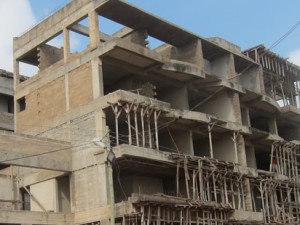Ghana’s construction sector eyes stronger growth
 Higher levels of infrastructure investment in the coming months should help Ghana’s construction industry rally after a slow start to 2016, although rising costs risk squeezing profit margins.
Higher levels of infrastructure investment in the coming months should help Ghana’s construction industry rally after a slow start to 2016, although rising costs risk squeezing profit margins.
The industry grew by just 0.3 per cent year-on-year (y-o-y) in the first quarter of the 2016, well below the annualised GDP increase of 4.9 per cent, and by just 0.1 per cent on the previous quarter, according to data released by the Ghana Statistical Service in late June.
According to the Ghana Economic Update report, which was produced by the Oxford Business Group (OBG), and made available to the Ghana News Agency on Friday; by contrast, Ghana’s construction sector expanded by 6.2 per cent y-o-y in 2015, with growth easing in the fourth quarter.
It said with a number of public works projects currently in the pipeline – ranging from housing developments to port upgrades – Ghana is likely to see an uptick in spending on construction projects in the coming months.
The report said increased costs and limited supplies are proving to be increasing challenges for contractors.
According to Ebenezer Denzel-Amanor, business development lead at Around the Clock Contractors, a Ghana-based engineering and construction firm, the price of raw materials used in construction, such as cement and water are rising, along with an increase in electricity tariffs and labour costs.
“Quality raw materials for construction are becoming increasingly difficult to obtain. To ensure a reliable supply, a proper value chain must be put in place,” Denzel-Amanor told OBG.
The report said in late December Ghana saw its first major price hike in electricity and water tariffs since 2013.
It said electricity prices increased 59.2 per cent while water increased by between 69 per cent and 89 per cent depending on usage, according to Ghana’s Public Utilities Regulatory Commission; media reports indicate that prices have in some cases risen even higher.
“Meanwhile, Ghana’s cement producers increased the price of cement by 9.6 per cent last year, resulting in a 50-kg bag costing GHS29.3 ($7.3), citing the depreciating cedi as the primary factor for the price change, according to press reports,” it stated.
The report said those prices might come under further pressure, following the government’s move to impose a ceiling on annual cement imports.
It said both local cement producers and the Cement Manufacturers Association of Ghana have called on the government to address what they consider unfair competition from imports.
Imports currently amount to approximately one million tonnes, in spite of the fact that Ghana’s production capacity of nine million tonnes surpasses local consumption of 6m tonnes, according to a statement from Ekwow Spio-Garbrah, the Minister for Trade and Industry.
The report said starting in August companies importing cement from outside the ECOWAS region would now need to apply for an operating license.
It said the government had sought to help mitigate some of the problems in the sector by rolling out new incentives and waivers for contractors participating in select large-scale infrastructure developments, which should help to reduce costs.
The report said the $1.5 billion expansion of the Port of Tema, which was being carried out by the Ghana Ports and Harbours Authority, Netherlands-based APM Terminals and French firm Bolloré Africa Logistics, is one such project.
It said an announcement in mid-June on tax concessions for the venture, which were valued at $832 million, include waivers on materials and equipment taxes, as well as a 10-year corporate tax exemption, according to press reports.
It said the fiscal incentives were part of a broader push by the public sector to stoke an uptick in construction activity, and industry growth in the medium term is expected to be supported by increased government investment in infrastructure, particularly transport projects.
“Foreign direct investment in construction will increase in the second half of 2016 through to 2017. There are road infrastructure and harbour expansion projects in Tema and Accra, and ongoing expansion work at Takoradi Harbour,” Kojo Brompong-Mensah, managing director of design and building firm BM Construction, told OBG.
OBG is a global publishing, research and consultancy firm, which publishes economic intelligence on the markets of Africa, the Middle East, Asia and Latin America and the Caribbean.
Through its range of print and online products, OBG offers comprehensive and accurate analysis of macroeconomic and sectoral developments, including banking, capital markets, insurance, energy, transport, industry and telecoms.
The critically acclaimed economic and business reports have become the leading source of business intelligence on developing countries in the regions they cover.
OBG’s online economic briefings provide up-to-date in-depth analysis on the issues that matter for tens of thousands of subscribers worldwide.
OBG’s consultancy arm offers tailor-made market intelligence and advice to firms currently operating in these markets and those looking to enter them.
Source: GNA
